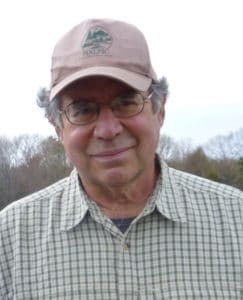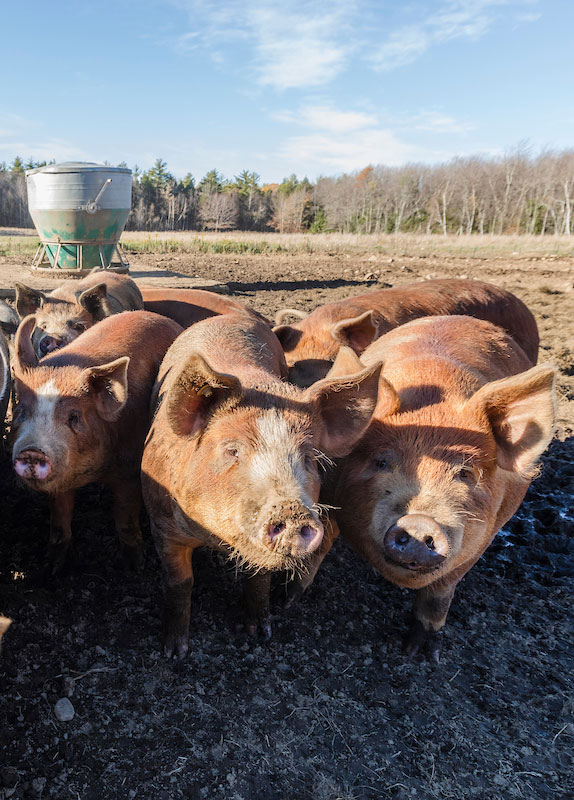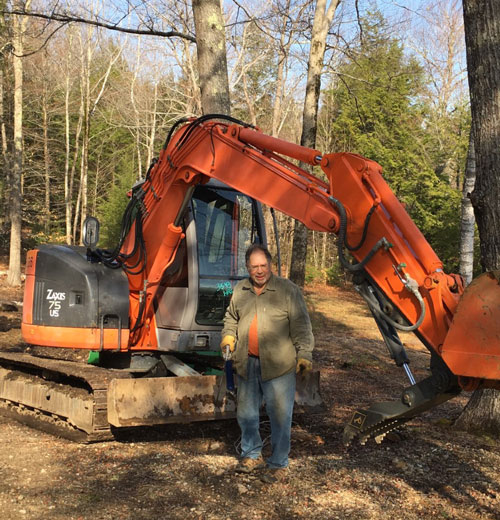Written by David Johnson
Photography by Jerry Monkman
For Carl Wallman, harmony was found in the stewardship of his land, the creative exchange of ideas, and the opportunity to share a legacy like no other with future generations of farmers.
The root of Carl Wallman’s love of land is deeply intertwined in his Jewish heritage and can be traced back to Russia, his family’s ancestral home. But his story starts with his father...
Manhattan
All Frank Wallman had was a suitcase when he stepped off the boat to make a new life in early 20th century New York City. That suitcase represented the total of all of his worldly possessions, but for him, a Russian Jew, just the promise of a brighter future was more than enough to root him in his new home.
And anything would be bright compared to where he came from, where Jewish persecution was the norm.
But a new norm eventually started to take shape. Frank started a linoleum business that churned enough revenue to allow him to purchase a few small apartment buildings (had for a song thanks to the pre-World War II real estate landscape). He saved his money, stewarded his holdings, and slowly, painstakingly carved out a good life for his wife and two sons – one of whom was Carl Wallman, born in 1944.
As he grew older, Carl cut his entrepreneurial teeth on his family’s business ventures. Following his father’s death in the 1960s, Carl arrived at a crossroads. He had money now, thanks to his inheritance, but was directionless. Carl’s uncle encouraged him to shift his attention to acquiring that which was most rare to Eastern European Jews: land.
So while the Big Apple had been good to the Wallmans, Carl set out for New Hampshire, in search of property he could call his own. When he arrived in the Granite State, he picked up the first newspaper he found, combed through the real estate section, and found a listing for a property in Northwood called Harmony Hill Farm.
That would do.
Short Creek Farm
It’s an unseasonably warm November day in Northwood, breezy and sunny, with only a faint of autumn chill; fleece-vest weather, maybe a hoodie, but that’s it. Not a bad day to see what’s happening at Short Creek Farm.
Known for its high-quality pork products, Short Creek is a working pig farm, founded in 2015 and operated by business partners – and high school friends – Jeff Backer and Dave Viola. Jeff, the farmer, and Dave, the food processor, have tag-teamed for the last five years creating fresh sausage, salami, bacon, pork chops, and ferments.
Jeff and Dave are in the field today, welcoming a gigantic grain shipment, which has stirred the pig herd, calling to their taste buds (which are pretty much on red alert all the time). Pigs of all shapes, sizes, and breeds navigate the fenced thoroughfares, oinking, digging, rolling, and slipstreaming their way through life.
Such is the sight at Short Creek – lots of activity, lots of mud, and a pasture littered with giant rocks (these pigs have a nose for excavation, which will help aerate the churned soil for future green rebirth). At Short Creek, it’s nonstop agricultural action, all carefully designed to produce the highest quality meats.
While Jeff and Dave have this all down to a science, they both arrived at Short Creek from different starting blocks. Jeff didn’t grow up as a farmer. In college he studied conservation biology and ecology and eventually made the shift to a more hands-on experience.
“At some point I said to myself I could just do the farming, instead of studying it,” he says.
In 2009 Jeff rented a small space to kickstart a vegetable garden and grow veggies for his co-workers – “Testing out farming,” as he describes it. After two years of apprenticeship on other farms, he started his own one-acre vegetable farm, eventually bringing on cattle grazing and, later, about 30 pigs.
That was when he and his old friend Dave began to seriously discuss going into business together. For Dave, he followed a similar track as Jeff – biology major in college who took on sausage-making as a hobby, until realizing he had a knack for food processing.
“We just started having conversations about good quality processing available to small, local farms,” Dave says. “That was where the seeds of this idea took root.”
They just needed some land to make this vision a reality.
Harmony Hill
Like his father, when Carl moved into his new home at Harmony Hill Farm, he brought with him very little except a deeply curious nature and work ethic that ran on nuclear fission. Those first few years at Harmony Hill were exercises in trying, failing, reevaluating, restarting, and, ultimately, succeeding. In fact, succeeding to the point where he became a force in the U.S. cattle industry.
“He was the most accomplished breeder of Angus cattle in the country,” says Peter Lamb, Carl’s long-time friend and advisor. “He would go to Texas, and the breeders down there with their big hats would ask ‘Who’s this guy?.' But he always knew his stuff.”
The success never dulled Carl’s edge for curiosity. Even as he accumulated more and more acreage and expanded his holdings, he was relentless in his pursuit of knowledge – particularly how it related to a human’s relationship with land.
“He was driven by his curiosity and an almost relentless need for discovery,” Peter says. “It was his character that allowed him to continually search for a better way. It was that search that brought him closer and closer to understanding the importance of land.”
“He had a clear vision of where he wanted to go,” said Steven Cohen, Carl’s friend. “A lot of the time he didn’t know what exact route to go, but he always figured it out. He lived within his beliefs.”
“It was his character that allowed him to continually search for a better way. It was that search that brought him closer and closer to understanding the importance of land.”
Through this discovery process, Peter watched Carl arrive at two core truths specific to his personal journey. The first: effective land management was found not in trying to bend the land to your will, but working in partnership with it – knowing what and where to plant, knowing what and where to cultivate, knowing what and where to clear. (It is apropos that his farm was called Harmony Hill.)
And while this first truth led to ecological and professional fulfillment for Carl Wallman the farmer, the second truth may have had a more profound impact on Carl Wallman the man.
“Through his own internal discovery, he came to understand more about his cultural and ethnic background,” Peter says. “His people had been dispossessed of land. And he had finally arrived at a place where he had accumulated a great amount of land, without knowing he was acting as a counterbalance to his own family heritage.”
“That became so important to Carl,” says Fran Berman, Carl’s partner. “His family had been thwarted from owning their own land, so it was a big impulse within the Wallman family to become landowners in their own right, to have that kind of control over their world.”
In 1994, Carl sold his Angus herd and moved to Graylag, an old basketball camp that had been run by Celtics great Bob Cousy in the 1950s. Located on Wild Goose Pond in Pittsfield, NH, it was here where Carl pivoted into the next phase of his landowning life, one of community connection and advocacy of the truths he had learned. And like most events of consequence in Carl’s life, it all started over a potluck.
In 2006, following many conversations over the dinner table (Carl’s preferred business milieu), he and his friend and peer Jim Oehler created the Northwood Area Land Management Collaborative (NALMC). The group’s mission: “Working across our stone walls.”
NALMC became a clearinghouse of conversation and concepts, where local landowners band together to exchange philosophies and pragmatism about what it means to work in concert with their land – to surmount the physical (and social) stone walls that may have cordoned them off from each other for so many years.
“It was about a shared land ethic,” Peter says. “It was about learning to care for land in different ways. In sustainable ways.”
Short Creek
Generally speaking, the prospect of an independent farmer generating the capital needed to outright purchase open space in New Hampshire is an uphill climb. It’s cited again and again in SELT’s discussions with farmers – land is expensive and hard to come by on a farmer’s income. Market-rate property values, even those subject to a conservation easement, and – particularly in a locale that is less than an hour removed from the ocean and the mountains and within commuting distance to Boston – can be so enormous as to curtail hopes of ownership.
“From an agricultural, environmental, and business perspective, Dave and Jeff are doing everything right,” says Jeremy Lougee, SELT’s Conservation Project Manager and Farmland Coordinator. “But sometimes doing everything right just isn't enough. We're just not quite at a place yet in society where most people understand the true value of local food production and the environmental resources – and necessary financial capital – that are needed to sustain it.”
So what options were available to Dave and Jeff to see their vision take shape? The answer to that question lay in Carl Wallman’s life journey of discovery and reflection.
For the past five years, Dave and Jeff have been leasing the land at Harmony Hill Farm, allowing them access to the acreage they need at an affordable cost and giving them the chance to build a client base, a reputation, and momentum to carry them to a sustainable operation.
“Carl was a little skeptical of us when we showed up,” Jeff says, laughing. “Pig farming was new to him and he wasn’t familiar with our approach,” Dave says. “But he eventually came to understand that Jeff puts in an incredible amount of effort to take care of the land and that resonated with him.”
It was a solid and symbiotic owner/tenant relationship, but there still remained an inexorable barrier between what Short Creek was and what Short Creek could be if land ownership were a possibility.
“Without ownership or some kind of very serious long-term lease it’s tough,” Jeff says. “For the kind of stuff we’re talking about, raising livestock in a way that is efficient and provides for the health and wellness for the animals, you need infrastructure and long-term improvements. That costs a lot and – you can’t take it with you.”
Enter the “OPAV” – the Option to Purchase at Agricultural Value.
“Carl was curious about how he could ensure that Harmony Hill remained a working farm, affordable and accessible not only for Dave and Jeff, but for future farmers,” said Jeremy. “We sat down with Carl and explained the concept of an OPAV. He thought it made a lot of sense.”
“Not only was Carl able to get the land into Jeff and Dave’s hands at a more affordable value,” Jeremy says, “but the OPAV and conservation easement together ensure that the lands will remain affordable to qualified farmers in the future.”
Graylag
Carl was at Graylag when the cancer came. He was diagnosed in 2004, went through chemotherapy and forced it back into remission. Ten years later the cancer reemerged with a vengeance. Despite a terminal diagnosis, Carl never lost sight of what illuminated him in the first place – the clarion call of land and its preservation.
“His whole cancer journey took place at Graylag,” Fran says. “He found nature to be very comforting throughout.”
Pick a clear day at Graylag and there was a more than excellent chance you’d find Carl astride an excavator, motoring across his property, digging into the dirt, peeling back layers of flora, and undertaking his favorite pastime: revealing the stone faces of ridgelines.
“Carl and that excavator!” Fran says, laughing. “It excited him to find new areas. I think you can trace it back to his childhood in Central Park, which was a refuge for him in Manhattan. Those giant rock faces, they inspired him.”
For fifteen years, Carl revealed the glacially-deposited rock faces at Graylag, then erected Leopold benches all around the property for passersby to sit and contemplate the power and peace of the natural world and its hidden secrets. Whether he intended it or not, these were monuments to harmony and curiosity, to persistence and achievement, to the methodical revelation of the treasure that lay just underneath the surface.
The parallels to Carl’s life are obvious – the son of an immigrant who fled persecution, a mild-mannered Manhattanite who came to New Hampshire with little more than a thirst for knowledge, and, underneath it all, an indomitable force of nature who impacted all within his orbit.
Dave Viola and Jeff Backer know this. Carl’s values have made it possible for them to own their land, grow their operation, and carry the banner of New Hampshire farming and food production forward. Peter Lamb knows this, as he cradles the cribbage board his old friend Carl gave to him many years ago, made from the black gum trees of Graylag, “Reaching across our own stone walls,” hewn into the amber wood.
And Fran Berman knows it, as she sat with Carl during those last few months, when cancer had laid claim to his body. Carl’s hospice was spent in a hospital bed that was brought into his living room. From where he lay, he could see the fields of Graylag and the waters of Wild Goose Pond.
Carl died February 14, 2020, in his home, on land that bore the legacy of the generations that preceded him.
Short Creek Farm
There is a wooden kiosk at the entrance to Harmony Hill. It contains some history of the property, a couple of maps, as well as information on the Northwood Area Land Management Collaborative. If you were to stand motionless, and catch your breath, and if the breeze carries just right, the organic and mechanical sounds of an active and productive farm ripple from the distance.
And in that moment of stillness, your eyes will likely be drawn to another kiosk display. It is a poem – Robert Frost’s Mending Wall – a favorite of Carl Wallman. You read the first three verses and understand why:
Something there is that doesn't love a wall,
That sends the frozen-ground-swell under it,
And spills the upper boulders in the sun.
The OPAV Advantage
The OPAV keeps the price of farms – conserved farms in particular – at a more accessible value for a farmer. At over 200 acres, Harmony Hill, while conserved, remains an expensive property. By adding the OPAV to the existing easement, the land becomes more affordable.
And when it comes time to sell the farm, the OPAV gives preference to a family or other working farmers before other potential buyers. If a non-farmer is poised to acquire the farm, SELT has the option to step in and acquire the property under the same terms and price structure, with the intention of then seeking a farmer, providing a path for the land to remain a working farm.
In 2019, Carl Wallman committed to amending the existing conservation easements to include the OPAV language, and then agreed to donate the ownership of Harmony Hill Farms to SELT. To make this possible, the Society for the Protection of New Hampshire Forests graciously agreed to assign all three conservation easements to SELT. SELT then worked with Carl (and his Trust) and the Town of Northwood to amend the conservation easements to include the OPAV. Carl’s Trust will then donate the land to SELT.
SELT will honor the original lease with Short Creek Farm, which provided Short Creek with a first right of refusal to acquire the house and land they were renting. In early 2021, SELT will sell the majority of the farm to Short Creek for its appraised value. The proceeds from the
sale will establish the “Wallman Farmland Legacy Fund.”
This Fund will support SELT’s ability to reacquire the farmland – should at some point in the future Short Creek Farm decide to sell and no eligible farmer is interested in acquiring it. In the intervening time, SELT can use the Fund to support the conservation, affordability, and accessibility of other working farms in our region.
“It’s an amazing and fitting legacy,” says Brian Hart, SELT’s Executive Director. “Like the cycle of life, Carl’s gift has the potential to keep birthing and rebirthing farms.”




